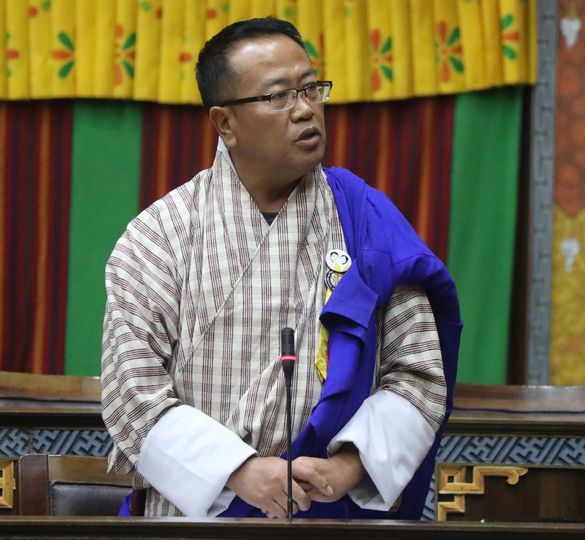
NGAWANG JAMPHEL
Thimphu
The National Assembly deliberated and approved a motion to amend Sections 19 and 20 of the Property Tax Act of Bhutan 2022 on 29 November. The motion, moved by the Gangzur-Minjey MP Loday Tsheten, brought to light several issues that have emerged since the Act’s implementation earlier this year.
The Act, originally designed to enhance agricultural production and promote food security, has faced criticism for inequitable tax concessions and flawed land classification methods, which have resulted in unintended consequences for landowners across the country.
At the heart of the debate was the unequal tax concessions granted to different types of land under the Act. Chhuzing (wetland) currently enjoys a 90% tax concession, while Kamzhing (dryland) receives only a 50% concession. This disparity, the motion argued, contradicts the principles of fairness, especially given the significant variations in land holdings among Bhutanese farmers.
Many small-scale landowners with limited Chhuzing plots have expressed concerns about the financial burden imposed by these provisions. The Member highlighted that the unequal concessions undermine equity and could exacerbate disparities between different categories of landowners.
Another key issue raised in the motion was the classification of land based on horizontal distance from municipal boundaries. This method, which determines tax rates, has been criticized for its inability to reflect the actual value and utility of the land.
The motion argued that this outdated approach distorts equity, as it fails to consider the unique characteristics of land parcels, such as their productivity or proximity to markets and infrastructure. Many have called for a more nuanced classification system that accurately represents the value of the land and aligns with its usage.
To address these concerns, the motion proposed three key recommendations. First, it called for equal tax concessions for both Chhuzing and Kamzhing to ensure fairness across all land types. Second, it urged reevaluating the current land classification methods to better reflect the true value of land and promote equity in taxation.
Lastly, it recommended that portions of land contributed for community purposes, such as public infrastructure or social services, be exempted from taxation. These amendments, the Member argued, would not only reduce financial burdens on landowners but also encourage agricultural production and strengthen Bhutan’s food security initiatives.
During the deliberations, the Minister for Agriculture and Livestock (MoAL) Yonten Phuntsho provided insights into the rationale behind the existing provisions. The Minister explained that Sections 19 and 20 of the Property Tax Act were introduced to address the declining agricultural production in Bhutan and to incentivize farming.
However, the Minister acknowledged the concerns raised in the motion and expressed support for revisiting the taxation framework to address these issues. The Minister also informed the House that a high-level committee under the National Land Commission has been tasked with studying the challenges associated with land taxation.
This committee, approved by the Lhengye Zhungtshog, is currently examining issues such as land classification, ground truthing, and taxation in both urban and rural areas.
Finance minister Lekey Dorji also contributed to the discussions, reaffirming the government’s commitment to ensuring a fair and equitable property tax system. He highlighted the importance of addressing public grievances and assured the House that the committee’s findings would provide a balanced approach to property tax implementation.
The Minister also noted that the committee is working on solutions related to Chhuzing, Kamzhing, and the Price-Adjusted Valuation of Assets (PAVA) rate, which have been major points of contention among landowners.
The motion received widespread support from members of the National Assembly, who recognized the need for amendments to create a more equitable and effective taxation framework. Public reaction to the motion has also been largely positive, with many expressing relief and optimism about the proposed changes.
Tashi Dema, a farmer from Punakha, said, “Equal tax concessions for all land types will ease the financial burden on farmers like me, especially those with smaller holdings. This is a much-needed reform.” Another resident, Sangay Dorji from Trashigang, shared, “The classification of land should reflect its true value. The current system is unfair and places an unnecessary burden on rural communities.”
Urban professionals have also voiced their support for the motion. Ugyen Zam, an urban planner from Thimphu, emphasized the importance of reevaluating land classifications. “This reform is crucial for ensuring fairness, especially in areas with mixed land use where the current system fails to account for actual land utility,” she stated.
Similarly, Dorji Wangmo, a young advocate, remarked, “This motion is a step toward equitable taxation and protecting rural livelihoods. It’s vital for Bhutan’s long-term food security.”
The National Assembly approved the motion with a majority vote, directing the government to report on the progress of the high-level committee’s work and provide updates from the relevant ministries during the summer session. The recommendations of the motion will now be referred to the National Land Commission through the Ministry of Agriculture and Livestock for further action.
By amending Sections 19 and 20 of the Property Tax Act, the government aims to create a more equitable framework that supports agricultural productivity, promotes fairness among landowners, and aligns with the nation’s broader goals of food security and rural development.





